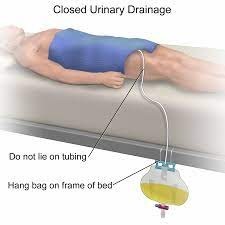A nurse at a long-term care facility is reviewing the plan of care for a client who has a prescription for mitten restraints. Which of the following tasks should the nurse assign to an assistive personnel?
Evaluate the need for the client to remain in mitten restraints.
Assist the client with range-of-motion exercises of the hands.
Instruct the client's family about the purpose of mitten restraints.
Determine the circulation status of the affected extremities every 2 hr
The Correct Answer is B
Range-of-motion exercises can be safely performed by assistive personnel under the supervision and direction of the nurse. It helps to maintain the mobility and function of the client's hands while in restraints.
Nursing Test Bank
Naxlex Comprehensive Predictor Exams
Related Questions
Correct Answer is D
Explanation
A) Coiling the tubing on the bed above the collection bag is incorrect because it can cause urine to flow back into the bladder, increasing the risk of infection and compromising the effectiveness of the drainage system. The tubing should be kept below the level of the bladder to ensure proper drainage.
B) Instructing the client to hold the drainage bag at waist height when ambulating is incorrect because the drainage bag should always be kept below the level of the bladder to prevent urine from flowing back into the bladder, which could lead to a urinary tract infection (UTI).
C) Collecting a sterile specimen from the urinary drainage bag is incorrect because urine in the drainage bag is not considered sterile. If a sterile specimen is needed, it should be obtained by cleaning the catheter's sampling port with an antiseptic solution and withdrawing urine directly from the port using a sterile syringe.
D) Securing the tubing with adhesive tape to the lower abdomen is correct because it helps prevent accidental pulling or tugging on the catheter, which could cause discomfort or dislodgement. Properly securing the tubing also helps maintain a continuous flow of urine and reduces the risk of infection.

Correct Answer is B
Explanation
The nurse should identify that disposing of contaminated sheets in a linen bag demonstrates effective use of supplies.
Wearing an N95 mask when bathing a client with Clostridium difficile is important, but it is not related to effective use of supplies.
Wearing clean gloves when performing oral hygiene is standard practice for infection control and not specific to the use of supplies.
Empting the sharps container when it is full is also important, but it is not related to effective use of supplies.
Whether you are a student looking to ace your exams or a practicing nurse seeking to enhance your expertise , our nursing education contents will empower you with the confidence and competence to make a difference in the lives of patients and become a respected leader in the healthcare field.
Visit Naxlex, invest in your future and unlock endless possibilities with our unparalleled nursing education contents today
Report Wrong Answer on the Current Question
Do you disagree with the answer? If yes, what is your expected answer? Explain.
Kindly be descriptive with the issue you are facing.
